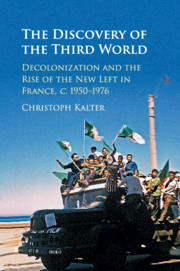Book contents
- Frontmatter
- Contents
- List of Figures
- Preface
- Acknowledgments
- Abbreviations
- 1 Introduction: From “Discovery” to Historiography
- 2 A New Concept of the World: The Third World in the Social Sciences and Politics
- 3 Conflicts, New Diversity, and Convergence: The New Radical Left in France
- 4 “From the Résistance to Anticolonialism”: The Politics of Memory in the New Radical Left
- 5 “Today We Have to Learn a Lesson from Them”: The Journal Partisans and the Opening Up to the Third World
- 6 “With Socialist Greetings”: The PSU, the Cedetim, and the Praxis of “International Solidarity”
- 7 Conclusion: Eyes on the World
- Appendix
- Bibliography
- Index
7 - Conclusion: Eyes on the World
Published online by Cambridge University Press: 05 September 2016
- Frontmatter
- Contents
- List of Figures
- Preface
- Acknowledgments
- Abbreviations
- 1 Introduction: From “Discovery” to Historiography
- 2 A New Concept of the World: The Third World in the Social Sciences and Politics
- 3 Conflicts, New Diversity, and Convergence: The New Radical Left in France
- 4 “From the Résistance to Anticolonialism”: The Politics of Memory in the New Radical Left
- 5 “Today We Have to Learn a Lesson from Them”: The Journal Partisans and the Opening Up to the Third World
- 6 “With Socialist Greetings”: The PSU, the Cedetim, and the Praxis of “International Solidarity”
- 7 Conclusion: Eyes on the World
- Appendix
- Bibliography
- Index
Summary
Between January 1961 and July 1962, priest Robert Davezies served a prison term for aiding the Algerian FLN as an anticolonial porteur de valises. Purely by chance, he met some Angolans in political circles in Paris following his release. Initially, Angola, where a war had raged since 1961 against Portuguese colonial rule, seemed very far away to him; but in time, the words of the nationalists penetrated his heart and mind. And so in the summer of 1964, Davezies traveled to Brazzaville and Kinshasa to interview representatives of the Angolan liberation movements Movimento Popular de Libertação de Angola (MPLA) and União das Populações de Angola (UPA). Afterward, he crossed the green border into Angola. Davezies published his conversations and observations in the form of a book in an effort to shake the French out of their indifference and to reveal to them who the Angolans really were: “a close people.” And Davezies went on: “Now that the time of artificial satellites has arrived, the earth is strangely small, the peoples are united in solidarity, and peace is indivisible…. The struggle against every form of exploitation of man by man concerns us all.”
Like many other texts of the New Radical Left, this one preserves traces of a wide-ranging mobility and a reflection on the experiences that came with it. Both things were constitutive of this Left: geographically extensive relationships and a thinking that sought to link local politics to distant societies and to integrate it into a coherent picture of global power constellations and power struggles, with the idea of the “Third World” central to this endeavor. To summarize, in conclusion, the interconnected history of the concept of the Third World and of the New Radical Left in France and simultaneously accent it from the perspective of global history, I will begin by recalling just how deeply globality and globalization shaped that history. By globality, I mean the relationships – extending across great distances – of certain actors to other people, spaces, institutions, and things, as well as the awareness of these relationships and their intellectual localization within a picture of the world as a whole. I use the process-oriented term globalization to describe the actual or perceived increase in globality.
- Type
- Chapter
- Information
- The Discovery of the Third WorldDecolonisation and the Rise of the New Left in France, c.1950–1976, pp. 419 - 434Publisher: Cambridge University PressPrint publication year: 2016



